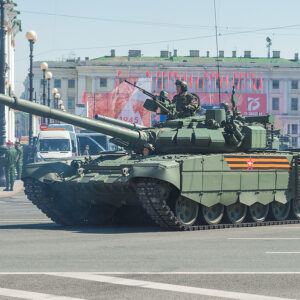For Russian President Vladimir Putin, history requires that Russia invade and control Ukraine. Putin perceives Ukraine as a vital buffer for Russian security. Twice in the last two centuries, invaders from Europe have ravaged Russia. In 1812, Napoleon led some 500,000 soldiers into Russia, defeating the Russian Army at the brutal Battle of Borodino and occupying a burning Moscow before his catastrophic retreat through the Russian winter. In June 1941 an unsuspecting Stalin, who had secretly allied with Hitler two years earlier to partition Poland with Germany upon Germany’s 1939 invasion of Poland, was stunned when Hitler launched a massive multi-pronged savage invasion of the Soviet Union.
One of the main thrusts of the German invasion was into Ukraine, which Germany quickly overran, corralling some 500,000 Soviet troops in a pincer movement east of and around Kiev. In spring 1942, the Soviet Army incurred major losses in the Second Battle of Kharkov, Ukraine. Ukraine was then a launching point for Hitler’s attack on Stalingrad, where at last the Soviets stopped and began to finally reverse the German onslaught. The Russian Republic of the Soviet Union alone lost an estimated 6,750,000 soldiers and over 7 million civilians in World War II, known in Russia as the Great Patriotic War.
Putin was born in 1952. His father and mother suffered greatly in the German siege of Leningrad. His older brother perished. Other family members died in the war.
For centuries, Germany was divided into multiple principalities. While Prussia achieved military prominence, a splintered Germany generally did not threaten neighbors. After Otto Von Bismarck united Germany in the late 1800s, World War I followed in 1914 with costly losses for Russia. Left united after its defeat in that war, some 20 years later Germany again launched war on its neighbors, with catastrophic consequences for Russia.
From the perspective of the victorious Soviet Union, Germany had to be dismembered to remove a future threat. The Soviet Union insured Germany’s dismemberment until the fall of the Berlin Wall and the collapse of East Germany in 1989-1990. Stalin also buffered his nation with the “Iron Curtain” of central and eastern European nations, which is now gone along with the Soviet Union’s Warsaw Pact alliance that countered NATO.
Russia historically has and still perceives NATO as hostile. Russia is wary of a reunited Germany. Putin has declared that the breakup of the Soviet Union was the greatest geopolitical disaster of the 20th century. For Putin, the parting of Ukraine and other former Soviet Republics was a great tragedy that insulted 1,000 years of Russian history. He presumably views the breakup as a weak, illegitimate capitulation by Yeltsin and Gorbachev, the latter allegedly having received an ignored oral commitment that with Gorbachev’s agreement to unify Germany, NATO would not expand eastward. For Putin, Ukraine is an essential part of Russia.
Ukraine’s application to be a NATO member must be seen against this backdrop. For Putin, Russia’s security demands that an increasingly strong and independent Ukraine be forcefully brought back under Russian control. For him, now is the time to do it. Russia is no longer the militarily weakened remnant of the Soviet Union that around 2000 itself sought an invitation to join NATO. America is likely seen as politically weak, divided, and fumbling in its recent defeat in Afghanistan. Europe reels from the Trump years. Ukraine’s military will only be stronger and better equipped in the future. Russia can handle Ukrainian guerrillas. It always has. Belarus is a seemingly willing invasion partner, but may not be in the future.
Russia reportedly has been preparing to manage western sanctions. Russia reportedly has already moved medical and other war-making logistical support to sustain its troops massed on Ukraine’s border. Russia intends to invade Ukraine.
In response, the West has publicly eschewed the use of military force. The West won’t even say, “depending on developments all options are on the table” for fear of “provoking” Putin.
What more can the West do? First, expressly make the statement that all options are on the table. Second, support that declaration with an urgent increase now (not after the invasion) and immediate forward positioning in NATO nations adjacent to Ukraine of American and NATO troops and capabilities. Third, publicly explain that the militaristic conduct of Russia and Belarus mandates attention to the protection of NATO borders and interests.
Are these steps overly “provocative?” They cannot provoke an invasion that would be coming anyway, but they stand a good chance of preventing it.


